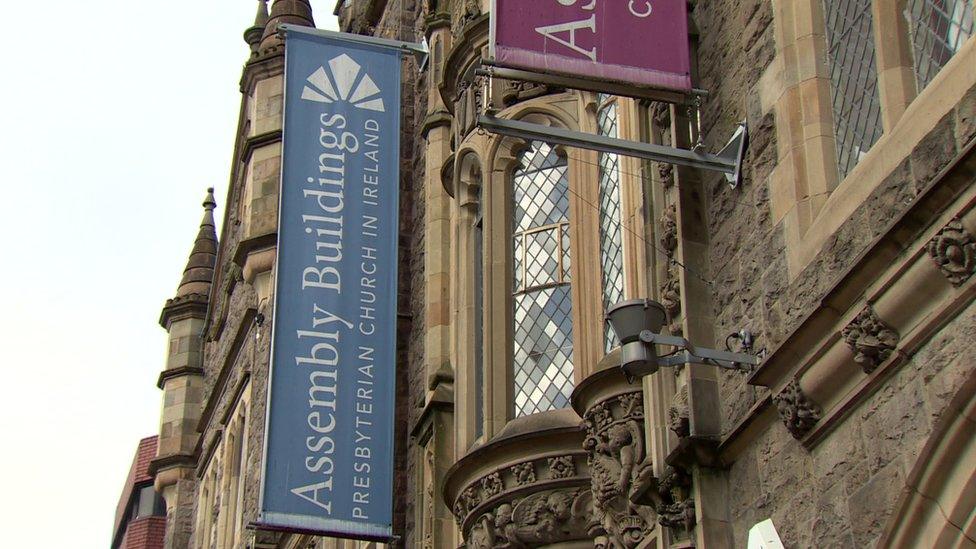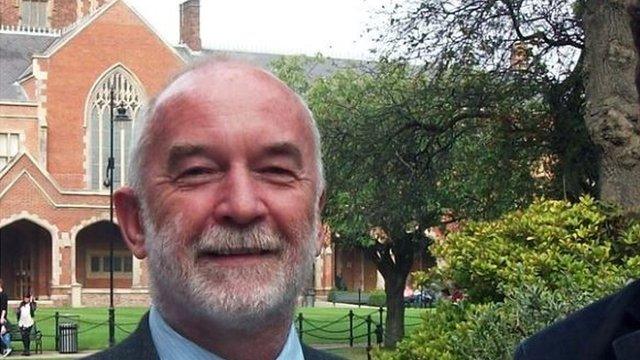Irish Presbyterian Church in 'theological brexit'
- Published

The Presbyterian church in Ireland's General Assembly took place in Belfast last week
"Theological Brexit" — that's how one senior Presbyterian minister described what had just happened at his church's annual General Assembly.
And, by any standards, what the Presbyterian Church's highest governing body did this week was historic.
On Wednesday, the ministers and elders gathered in Belfast voted by a substantial majority to, in effect, sever diplomatic relations with both the Church of Scotland and the United Reformed Church.
They agreed that they will continue to co-operate with both denominations, where appropriate, in common projects.
But the Irish Presbyterian Church will no longer invite their representatives to attend its annual Assembly and will no longer be sending a delegation to theirs.
Caution against 'separatism'
It was a decision that did not side easily with the current Moderator's chosen theme for his year in office - "building relationships".
Nor with the church's recent public statements encouraging Northern Ireland's politicians to work through their differences in an effort to restore a power-sharing Assembly at Stormont.
One former moderator, Dr Trevor Morrow, in seeking to persuade his colleagues to vote differently, cautioned them against "separatism".

The Church of Scotland's General Assembly authorised officials to review any changes in church law necessary to allow ministers to preside at same-sex-marriages
Another, Dr John Dunlop, in an impassioned plea, even appeared to challenge their theological right to separate.
To do so, he said, could be tantamount to flouting their biblical obligation to share in fellowship with a properly constituted church- even if they regretted the recent direction of travel of that church.
But the vote could not be avoided. This was a moment of truth for the General Assembly that now seems almost inevitable.
As I watched the result of the vote announced by the Moderator, Dr Charles McMullen, it was like watching the final, rather formal stage of a couple divorcing - with all the pain and heartache, regret and anger, that so often accompanies a long relationship coming to an end.
And this was a very long relationship.
Presbyterianism in Ireland is an off-shoot of the Church of Scotland: its first ministers arrived during the Plantation of Ulster in the early 17th century.
'Once mother church, now distant cousins'
For generations, Irish Presbyterians were proud to describe the Church of Scotland as their "mother church".
In recent years, as the cultural and theological differences between the two denominations became more pronounced and more apparent, the term "sister church" acquired more currency.
Now, the Presbyterians of Ireland and Scotland appear to be increasingly distant cousins.
The Scots have made it clear that they want to maintain the friendship, even in the face of growing disagreements.

Rev Charles McMullen was elected church moderator on Monday
But the majority of ministers and elders at the Irish General Assembly signalled that they'd had enough.
Those making the case for a formal separation said the theological distance between Ireland and Scotland had widened so far that it could no longer be tolerated - the Scottish church's decisions over recent years to affirm the equal place of its LGBT members.
'Same-sex relationship incompatible'
It already permits the ordination of lesbian and gay ministers, including ministers in same-sex relationships
Last month its General Assembly, meeting in Edinburgh, authorised officials to review any changes in church law necessary to allow ministers to preside at same-sex-marriage weddings.
Meanwhile, this week in Belfast, the Irish General Assembly asserted, in a report from its Doctrine Committee, that being in a same-sex relationship is incompatible with full membership of the church, and that the children of same-sex couples should be denied baptism.
While some will regard that stance as harsh, perhaps even cruel, its advocates say they are merely upholding biblical teaching and preserving their own doctrinal integrity.
But, however you read it, this is the clearest indication so far from Northern Ireland's largest Protestant denomination that it is travelling in an entirely different direction.
In effect, it is the theological equivalent of taking back control of its traditional teachings in the face of a changing culture within parts of the church, particularly in the West, that appear willing to accept and affirm sexual diversity.

Professor Laurence Kirkpatrick said that the Irish and Scottish churches share the same DNA and the separation carries with it the potential for a split within Irish Presbyterianism
The actions of this year's General Assembly undoubtedly separate the Irish Presbyterian Church from many other churches across Europe who have reached out to LGBT people with a message of welcome and affirmation.
'Tragic decision'
The Irish church's decisions this week also present serious pastoral challenges for congregations seeking to relate to the communities around them.
And there is clearly a risk that the church's message will alienate even sections of its own membership, particularly younger Presbyterians, who have shown a willingness to embrace many of the cultural changes taking place in our society.
Expressing his personal dismay at the "tragic" decision to sever its Assembly-level links with the Church of Scotland, Professor Laurence Kirkpatrick, a Presbyterian minister and historian, told the BBC that the Irish and Scottish churches share the same DNA and that this week's formal separation carries with it the potential for a split within Irish Presbyterianism.
Certainly, the fractures within the Irish church were already painfully visible in the tears of some of those who walked away from its divided General Assembly.
- Published6 June 2018
